#but if not it is fair game
Text
I've decided the perfect Stobin au is a psych au/fusion. I don't know if I'll ever clear my plate enough to write it so let me share some world building highlights I dreamt of last night:
Steve, with his people reading skills and his ADHD brain that holds on to strange bits of information forever, accidentally convinces the Hawkins police force that he's psychic.
Robin plays his (thematic) straight man. Trading off antics and helping to fill in the gaps in Steve's knowledge base/memory
This only even happens because the temp agency placed Robin at a separate job from Steve, tragic, and he had too much time on his hands to get a crush on the local dinner guy
The local dinner guy who gets framed for a crime he didn't commit, and when Steve goes in just to provide a character witness he gets accused of being an accomplice. Somehow between this point and being released Steve convinces them he's psychic -- it's important to note even Steve is unclear on how this happens
When Robin finds out Steve has already decided they can solve this. And self employment is pretty much the only way to make sure they can work together forever and no one can separate them
Through the power of gossip, audacity, and actually doing some investigative work. Stobin do of course solve the crime
More general lore thoughts: this is an aged up au so that Steve wouldn't have to have a strained tough love relationship with his dad ala actual psych sure you could use Hopper in place of Henry but I think it's more fun to shove a newly graduated Dustin into just some kind of generic science lab. Who needs a dad for advice when you have six kids?
Every eligible lady in Hawkins is obsessed with Robin and her private eye drip, can an au that doesn't exist have a running gag?
Most crucially, regardless of any boy or girl crushes, this is an au about stobin getting into antics. Steve tapping in to his inner theater kid while Robin nods sagely in the back. Robin asking the most uncomfortable question a person has ever asked another human while Steve smiles and gaslights them into believing its acceptable. Steve and Robin paying themselves to hang out all day and yeah maybe along the way they solve a murder if they're up to it, who knows they've got a lot planned
#stobin#platonic stobin#steve and robin#i apologize for spamming the tags cause this is mostly for my own sorting#i really maybe will write this one day#but if not it is fair game#also if it already exists please send it to me
257 notes
·
View notes
Text
I love that in Catching fire Katniss comes to the conclusion the other tributes are trying to keep Peeta alive because they must see how amazingly perfectly wonderful he is. When in actuality that’s just her having a crush and everyone else recognizing that if Peeta gets hurt Katniss will go fully feral and unhinged and probably try to kill everyone and then herself.
#Katniss is the only one not aware she is the main character#she’s too distracted staring at Peetas eyelashes#and fair enough#katniss everdeen#everlark#the hunger games#peeta mellark
39K notes
·
View notes
Text
Pokemon is amazing because it started out being coded with duct tape and prayers by a small team of people. flash forward twenty years and guess what? it's now coded with duct tape and prayers by a medium-sized team of people
#pokemon#pkmn#gamefreak#outdesign posts things#though to be fair gen 1 was them trying to cram together a game with like 2 mb of space to work with#modern GF really doesn't have an excuse#greatest hits
8K notes
·
View notes
Photo
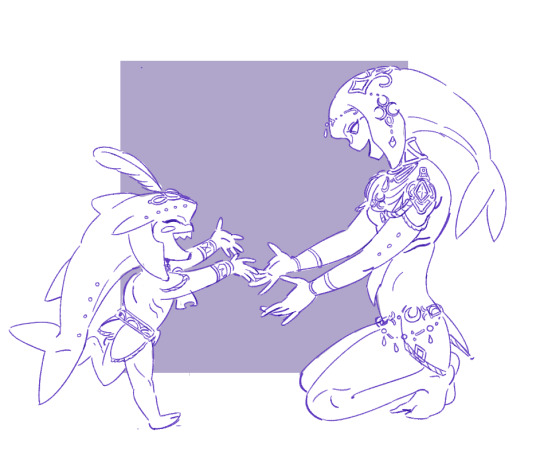
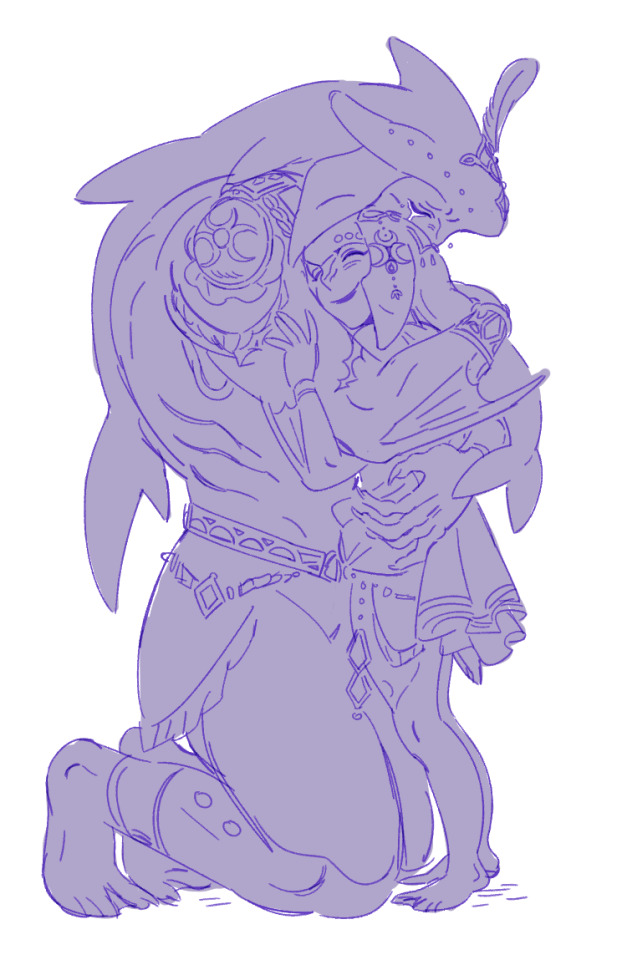
little brother
#loz#legend of zelda#breath of the wild#botw#mipha#prince sidon#thinking zora size dimorphism is a little stupid vs boo hoo younger sibling being taller FIGHT#art#drawn after age of calamity came out & held off until spoilers were fair game. and then. i just forgot about these entirely#but totk reminded me to see if i have any zelda stuff on hand
10K notes
·
View notes
Text
He's not my enemy. He is my homoerotic rival and if anybody but me ever tries to hurt him I will promptly kill them.
#hannibal lecter#will graham#hannigram#hannibal#this is applicable to many pairings so pls feel free to blorbo tag#this is just a thought i had while making up witty banter for a fanfic#nbc hannibal#hannibal nbc#hannibal the cannibal#i hate to say it but#drarry#draco malfoy#harry Potter#listen i hate her just as much as most trans people but the fanfiction is fair game#enemies to lovers#enemies with benefits#enemies to friends trope#nygmobblepot#idk how i didn't think of them#my loves#edward nygma#oswald copplepot#batjokes#bruce wayne#joker
18K notes
·
View notes
Text

It’s okay Aang, eventually (right,,,?🔪)
Ahahaha,,, hahaha,,, sorry @lovelyelbowleech I know there’s more to take away from the last two chapter of War Games but mmmm aaaah hmmm uhhhh
#atla fanart#atla fanfic#avatar: the last airbender#avatar the last airbender#aang#sokka#katara#toph#zukka#war games#war crimes#all’s fair#all’s fair fanart#war games fanart#fic art#fanart#lovelyelbowleech#Gaang#avatar fanart
7K notes
·
View notes
Text
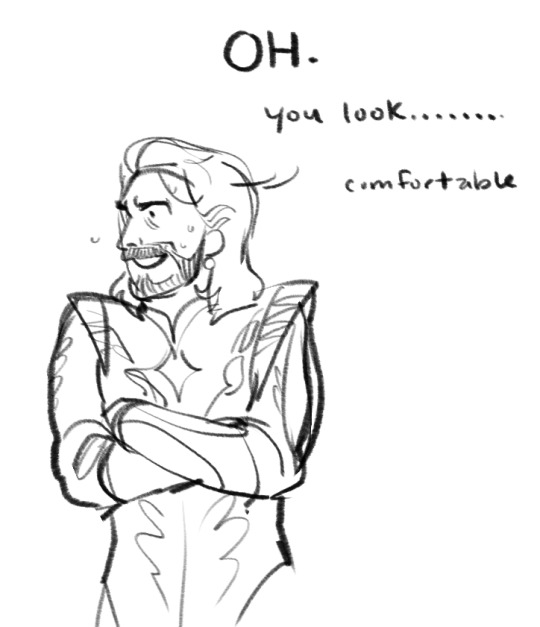

desensitize your wizard bomb early and often
#bg3#gale of waterdeep#gale x tav#gale bg3#gale dekarios#i wouldve played bg3 way hornier if gale wasn't so chaste. AH WELL#early game gale is like “wait 'wizard' is slang for incel?? wtf that's not fair” and then proceeds to have the most chaste romance#yeah bud. wizard means incel#what if gale fucked way more than any of his wizard colleagues but that still means he didnt get laid til like 25#and he's convinced he's a total chad in normal society#anyway happy valentines lol#sune
2K notes
·
View notes
Text
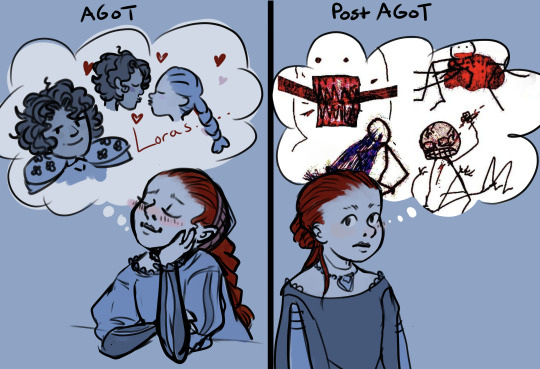
Oh to be twelve and consumed with girl rage
#sansa stark#asoiaf#valyrianscrolls#game of thrones#my art#fanart#to be fair she's still thinking about boys but just in a different way (harm to them)#you watch your father get beheaded once and then it’s all ‘I want the king to get mauled by wolves’
3K notes
·
View notes
Text
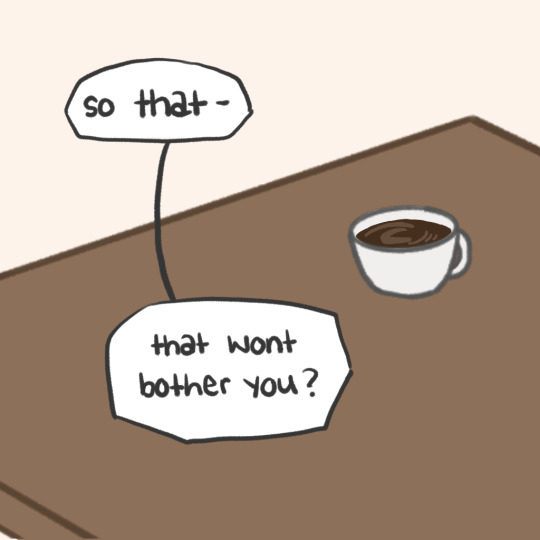
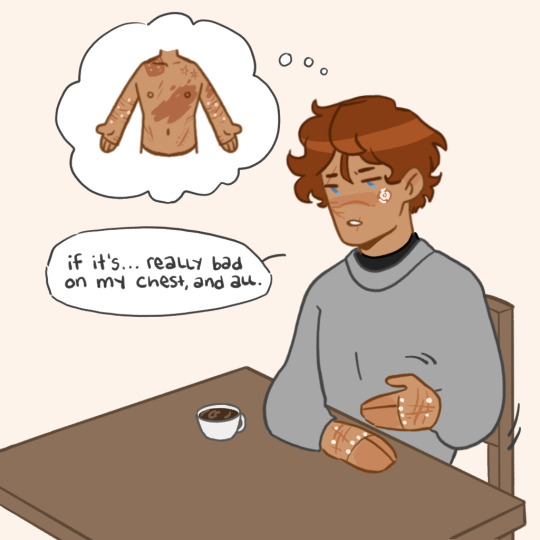
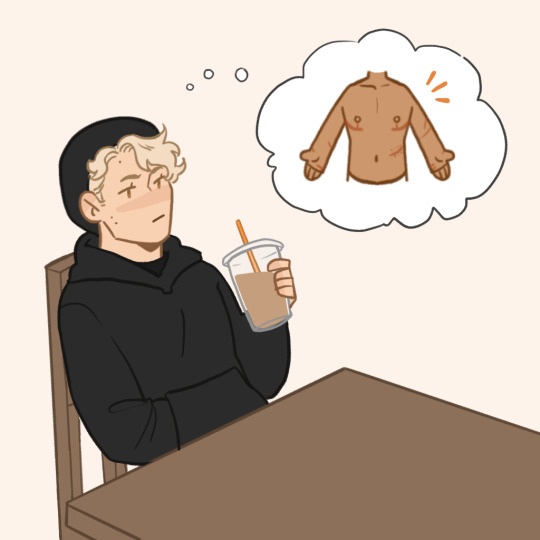
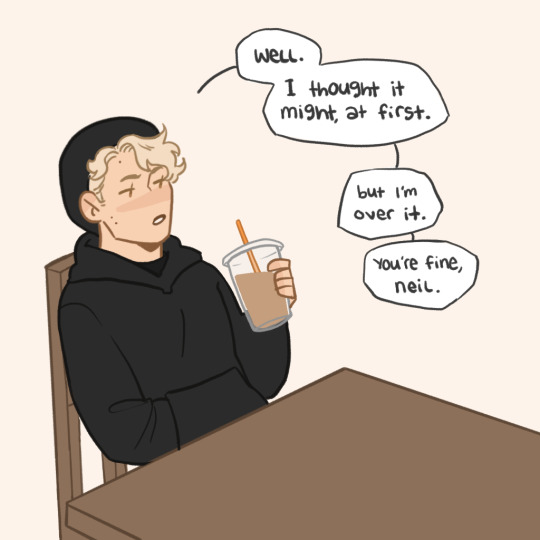
When the misunderstanding is mutual but they’re both so sweet about it (coffee shop au edition)
Inspired by the tags below (originally on this post) from @blahblaheverythingisgay and @lovelyprincejehan accompanied by some thoughts:


thank you for bringing this GALAXY brain take to my attention 😂 this guy comes in, all cagey about his past and his scars, always wearing baggy clothes but complaining about compression clothes (being on the run does a number on your joints and muscles), picking out a name for himself??? OBVIOUSLY he’s trans right
They somehow manage to have like three separate conversations about it without realizing they’re talking about two very different scenarios. Andrew only was so wrong for so long because scars on their own (and even being a criminal lbr) are such non-issues that it didn’t even occur to him that Neil could be talking about anything less important than being trans lol
Andrew had his little crisis about it and landed pretty solid on yeah he’s still into Neil regardless, and yeah he’s still super gay. He’ll figure out the rest from there. The only thing he didn't prepare for was Neil being uh. Cis
#that’s still his Neil 🙏#and it makes me laugh so much for Andrew to be THROWN#when his not-bf in his not-relationship is actually cis#who could’ve seen it coming.#not Andrew#and to be fair probably also like half the foxes. they thought they had this guy figured out#we love a good shenanigan#and no foxes were even harmed in the making of this misunderstanding#everything works out!!#lowest stakes au I have yet#love that for us#fan art#my art#aftg#all for the game#neil josten#andrew minyard#andreil#coffee shop au#digital
1K notes
·
View notes
Text
I’m fucking dying Astarion’s early party banter is him just flirting with all the companions and striking out; none of them are having it. When he comes on to Tav at the party, not only is he manipulating them, but they are literally his last choice. Not even plan b or c, Tav was plan ‘fuck it, I guess we’re doing this!’ and that clown still fell into his own pit trap.
#My roommate asked me why I romance him and like him so much#because all I tell her when we sit on the couch playing our respective games next to each other is what a snarky bastard he is#the answer is that he’s funny#my roomie said ‘i guess that’s fair. A guy can get away with manipulating me if he’s pretty and makes me laugh’#bg3 astarion#baldurs gate tav#bg3#baldurs gate 3#astarion x tav
4K notes
·
View notes
Text
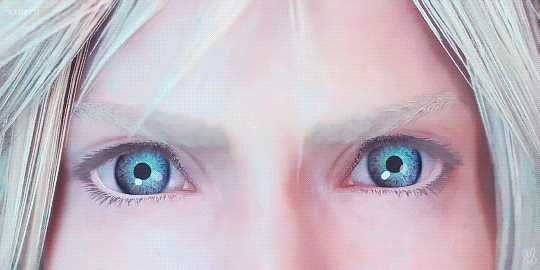






FINAL FANTASY VII REBIRTH (2024)
↳ Sephiroth vs Cloud and Zack
#ffvii#final fantasy vii#cloud strife#zack fair#sephiroth#zakkura#sefikura#ffgraphics#gamingedit#gaming#*#ff7r#final fantasy vii rebirth#final fantasy#ff7#final fantasy 7#ff7 rebirth#dailygaming#ffedit#ff7 remake
1K notes
·
View notes
Text

“spider-man 2 was robbed” “the game awards are rigged” and only yuri lowenthal was brave enough to raise the discussion of would peter parker and astarion explore each other’s bodies in their respective action adventure/rpg narratives
#yes they would#i also thought ab how biting would factor in with Peter’s spider dna and decided astarion’s into it#if you think he’d react the way he did to gale’s blood then i GUESS that’s also fair#bring on the real discourse we should already know that bg3 and sm2 and every other nominee were fucking awesome#(but bg3 was probably my personal goty)#anyway yuri’s so real for this#peter parker#astarion#marvel’s spider-man 2#baldur’s gate 3#the game awards#yuri lowenthal#neil newbon
2K notes
·
View notes
Text
this is ur daily reminder that crepus didn’t just die in front of diluc, diluc killed him to spare him from the suffering when the delusion backfired
#the whole crepus dying and ragbro fight is so misconstrued it drives me wild#genshin spoilers#to be fair this is the entire prequel of the game so ??#pre spoilers?#intro spoilers?#lmao
7K notes
·
View notes
Text
yall like to pretend that "don't split up" is the most obvious rule in any horror scenario, but what's the alternative? stick together and cooperate ? to find a solution? in a life-or-death situation??? babe surely you have been in enough group projects to guess how that shit ends
#honestly would prefer to try to strike a work-study deal with the Killer#rather than team up with your average group of horror movie characters#listen. the Killer has their shit together. they've planned this. they have clear goals. they have tools. they have a timeline.#whereas the So-Called Protagonists decided it would be 'fun' to get drunk in a cabin in the woods with no cell reception#honestly i'm siding with the Killer on this one. at some point that's fair game. ethically sourced murder victims
3K notes
·
View notes
Text
incidentally for the people who aren’t zedaph watchers I have to express just HOW MUCH the crevasse is a step forward for zedaph building. season six he. didn’t have a base really if I recall correctly. in season seven he had an undecorated cave he put silly machines in. season eight he at least DECORATED but it was sure still a hole in a mountain. season nine it was a base he did a BUILD with! still a hole in a mountain. season ten is a STEP UP it’s a hole with NO MOUNTAIN REQUIRED,
#hermitcraft#zedaph#I SAY THIS LOVINGLY AND I HONESTLY LOVE HIS BUILDS#and his s9 base was gorgeous and a great monument to Zedvancements#but it’s SO FUNNY. predictable king who builds the same way I do: panic and dig a hole.#I wasn’t around for s5 to see how that fits into this trend. I suspect it was also a hole in a mountain tho.#although this isn’t fair of me. he ALSO had a game show. that’s basically the same thing as a base.
1K notes
·
View notes
Text
Good riddance to the Open Gaming License
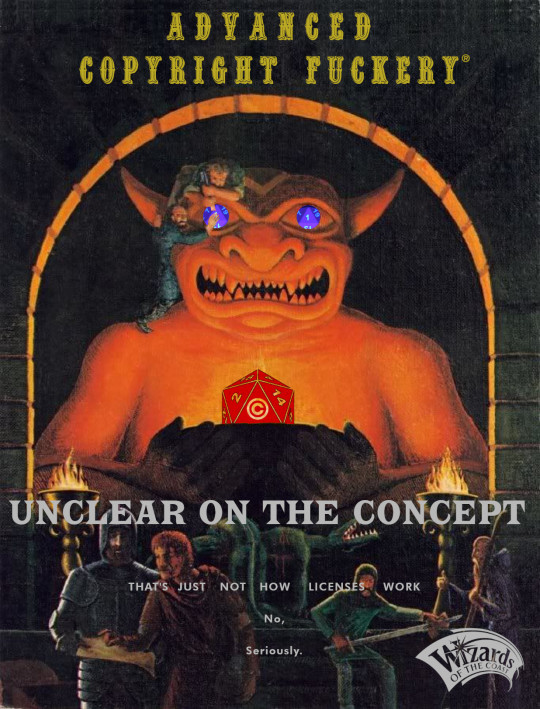
Last week, Gizmodo’s Linda Codega caught a fantastic scoop — a leaked report of Hasbro’s plan to revoke the decades-old Open Gaming License, which subsidiary Wizards Of the Coast promulgated as an allegedly open sandbox for people seeking to extend, remix or improve Dungeons and Dragons:
https://gizmodo.com/dnd-wizards-of-the-coast-ogl-1-1-open-gaming-license-1849950634
The report set off a shitstorm among D&D fans and the broader TTRPG community — not just because it was evidence of yet more enshittification of D&D by a faceless corporate monopolist, but because Hasbro was seemingly poised to take back the commons that RPG players and designers had built over decades, having taken WOTC and the OGL at their word.
Gamers were right to be worried. Giant companies love to rugpull their fans, tempting them into a commons with lofty promises of a system that we will all have a stake in, using the fans for unpaid creative labor, then enclosing the fans’ work and selling it back to them. It’s a tale as old as CDDB and Disgracenote:
https://en.wikipedia.org/wiki/CDDB#History
(Disclosure: I am a long-serving volunteer board-member for MetaBrainz, which maintains MusicBrainz, a free, open, community-managed and transparent alternative to Gracenote, explicitly designed to resist the kind of commons-stealing enclosure that led to the CDDB debacle.)
https://musicbrainz.org/
Free/open licenses were invented specifically to prevent this kind of fuckery. First there was the GPL and its successor software licenses, then Creative Commons and its own successors. One important factor in these licenses: they contain the word “irrevocable.” That means that if you build on licensed content, you don’t have to worry about having the license yanked out from under you later. It’s rugproof.
Now, the OGL does not contain the word “irrevocable.” Rather, the OGL is “perpetual.” To a layperson, these two terms may seem interchangeable, but this is one of those fine lawerly distinctions that trip up normies all the time. In lawyerspeak, a “perpetual” license is one whose revocation doesn’t come automatically after a certain time (unlike, say, a one-year car-lease, which automatically terminates at the end of the year). Unless a license is “irrevocable,” the licensor can terminate it whenever they want to.
This is exactly the kind of thing that trips up people who roll their own licenses, and people who trust those licenses. The OGL predates the Creative Commons licenses, but it neatly illustrates the problem with letting corporate lawyers — rather than public-interest nonprofits — unleash “open” licenses on an unsuspecting, legally unsophisticated audience.
The perpetual/irrevocable switcheroo is the least of the problems with the OGL. As Rob Bodine— an actual lawyer, as well as a dice lawyer — wrote back in 2019, the OGL is a grossly defective instrument that is significantly worse than useless.
https://gsllcblog.com/2019/08/26/part3ogl/
The issue lies with what the OGL actually licenses. Decades of copyright maximalism has convinced millions of people that anything you can imagine is “intellectual property,” and that this is indistinguishable from real property, which means that no one can use it without your permission.
The copyrightpilling of the world sets people up for all kinds of scams, because copyright just doesn’t work like that. This wholly erroneous view of copyright grooms normies to be suckers for every sharp grifter who comes along promising that everything imaginable is property-in-waiting (remember SpiceDAO?):
https://onezero.medium.com/crypto-copyright-bdf24f48bf99
Copyright is a lot more complex than “anything you can imagine is your property and that means no one else can use it.” For starters, copyright draws a fundamental distinction between ideas and expression. Copyright does not apply to ideas — the idea, say, of elves and dwarves and such running around a dungeon, killing monsters. That is emphatically not copyrightable.
Copyright also doesn’t cover abstract systems or methods — like, say, a game whose dice-tables follow well-established mathematical formulae to create a “balanced” system for combat and adventuring. Anyone can make one of these, including by copying, improving or modifying an existing one that someone else made. That’s what “uncopyrightable” means.
Finally, there are the exceptions and limitations to copyright — things that you are allowed to do with copyrighted work, without first seeking permission from the creator or copyright’s proprietor. The best-known exception is US law is fair use, a complex doctrine that is often incorrectly characterized as turning on “four factors” that determine whether a use is fair or not.
In reality, the four factors are a starting point that courts are allowed and encouraged to consider when determining the fairness of a use, but some of the most consequential fair use cases in Supreme Court history flunk one, several, or even all of the four factors (for example, the Betamax decision that legalized VCRs in 1984, which fails all four).
Beyond fair use, there are other exceptions and limitations, like the di minimis exemption that allows for incidental uses of tiny fragments of copyrighted work without permission, even if those uses are not fair use. Copyright, in other words, is “fact-intensive,” and there are many ways you can legally use a copyrighted work without a license.
Which brings me back to the OGL, and what, specifically, it licenses. The OGL is a license that only grants you permission to use the things that WOTC can’t copyright — “the game mechanic [including] the methods, procedures, processes and routines.” In other words, the OGL gives you permission to use things you don’t need permission to use.
But maybe the OGL grants you permission to use more things, beyond those things you’re allowed to use anyway? Nope. The OGL specifically exempts:
Product and product line names, logos and identifying marks including trade dress; artifacts; creatures characters; stories, storylines, plots, thematic elements, dialogue, incidents, language, artwork, symbols, designs, depictions, likenesses, formats, poses, concepts, themes and graphic, photographic and other visual or audio representations; names and descriptions of characters, spells, enchantments, personalities, teams, personas, likenesses and special abilities; places, locations, environments, creatures, equipment, magical or supernatural abilities or effects, logos, symbols, or graphic designs; and any other trademark or registered trademark…
Now, there are places where the uncopyrightable parts of D&D mingle with the copyrightable parts, and there’s a legal term for this: merger. Merger came up for gamers in 2018, when the provocateur Robert Hovden got the US Copyright Office to certify copyright in a Magic: The Gathering deck:
https://pluralistic.net/2021/08/14/angels-and-demons/#owning-culture
If you want to learn more about merger, you need to study up on Kregos and Eckes, which are beautifully explained in the “Open Intellectual Property Casebook,” a free resource created by Jennifer Jenkins and James Boyle:
https://web.law.duke.edu/cspd/openip/#q01
Jenkins and Boyle explicitly created their open casebook as an answer to another act of enclosure: a greedy textbook publisher cornered the market on IP textbook and charged every law student — and everyone curious about the law — $200 to learn about merger and other doctrines.
As EFF Senior Staff Attorney Kit Walsh writes in her must-read analysis of the OGL, this means “the only benefit that OGL offers, legally, is that you can copy verbatim some descriptions of some elements that otherwise might arguably rise to the level of copyrightability.”
https://www.eff.org/deeplinks/2023/01/beware-gifts-dragons-how-dds-open-gaming-license-may-have-become-trap-creators
But like I said, it’s not just that the OGL fails to give you rights — it actually takes away rights you already have to D&D. That’s because — as Walsh points out — fair use and the other copyright limitations and exceptions give you rights to use D&D content, but the OGL is a contract whereby you surrender those rights, promising only to use D&D stuff according to WOTC’s explicit wishes.
“For example, absent this agreement, you have a legal right to create a work using noncopyrightable elements of D&D or making fair use of copyrightable elements and to say that that work is compatible with Dungeons and Dragons. In many contexts you also have the right to use the logo to name the game (something called “nominative fair use” in trademark law). You can certainly use some of the language, concepts, themes, descriptions, and so forth. Accepting this license almost certainly means signing away rights to use these elements. Like Sauron’s rings of power, the gift of the OGL came with strings attached.”
And here’s where it starts to get interesting. Since the OGL launched in 2000, a huge proportion of game designers have agreed to its terms, tricked into signing away their rights. If Hasbro does go through with canceling the OGL, it will release those game designers from the shitty, deceptive OGL.
According to the leaks, the new OGL is even worse than the original versions — but you don’t have to take those terms! Notwithstanding the fact that the OGL says that “using…Open Game Content” means that you accede to the license terms, that is just not how contracts work.
Walsh: “Contracts require an offer, acceptance, and some kind of value in exchange, called ‘consideration.’ If you sell a game, you are inviting the reader to play it, full stop. Any additional obligations require more than a rote assertion.”
“For someone who wants to make a game that is similar mechanically to Dungeons and Dragons, and even announce that the game is compatible with Dungeons and Dragons, it has always been more advantageous as a matter of law to ignore the OGL.”
Walsh finishes her analysis by pointing to some good licenses, like the GPL and Creative Commons, “written to serve the interests of creative communities, rather than a corporation.” Many open communities — like the programmers who created GNU/Linux, or the music fans who created Musicbrainz, were formed after outrageous acts of enclosure by greedy corporations.
If you’re a game designer who was pissed off because the OGL was getting ganked — and if you’re even more pissed off now that you’ve discovered that the OGL was a piece of shit all along — there’s a lesson there. The OGL tricked a generation of designers into thinking they were building on a commons. They weren’t — but they could.
This is a great moment to start — or contribute to — real open gaming content, licensed under standard, universal licenses like Creative Commons. Rolling your own license has always been a bad idea, comparable to rolling your own encryption in the annals of ways-to-fuck-up-your-own-life-and-the-lives-of-many-others. There is an opportunity here — Hasbro unintentionally proved that gamers want to collaborate on shared gaming systems.
That’s the true lesson here: if you want a commons, you’re not alone. You’ve got company, like Kit Walsh herself, who happens to be a brilliant game-designer who won a Nebula Award for her game “Thirsty Sword Lesbians”:
https://evilhat.com/product/thirsty-sword-lesbians/
[Image ID: A remixed version of David Trampier's 'Eye of Moloch,' the cover of the first edition of the AD&D Player's Handbook. It has been altered so the title reads 'Advanced Copyright Fuckery. Unclear on the Concept. That's Just Not How Licenses Work. No, Seriously.' The eyes of the idol have been replaced by D20s displaying a critical fail '1.' Its chest bears another D20 whose showing face is a copyright symbol.]
#pluralistic#copyfraud#wizards of the coast#wotc#dungeons and dragons#d&d#ogl#open gaming license#eff#fair use#kit walsh#consideration#licenses
8K notes
·
View notes